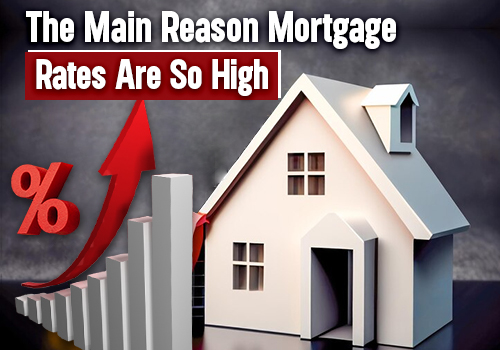People frequently require large bank loans when they wish to purchase a home. However, the bank doesn't just give the money out as a loan. They also charge "interest," which is similar to the cost of giving them your money.
As the costs of interest rise, customers are obligated to repay extra cash in addition to the loans they obtained when they bought their homes for sale. Therefore, the rates of interest on mortgages for buying a house are still a bit steep. You will learn about a few reasons for high mortgage rates in this article, though.
1. Lots Of Borrowing
Individuals who have money to lend may lend more if more people ask for loans. However, if you want to borrow money to buy a house, they could demand a little fee in the form of interest. They feel more comfortable lending as a result. Banks occasionally increase interest rates a little when plenty of people want to borrow money to make sure they're satisfied as well.
Therefore, borrowing money when shopping for a property is OK. However, keep in mind that when many people borrow, banks may require a little more, which is why mortgage rates may increase.
-
Major Objectives: Borrowing enables you to obtain the items that you require as you need them, regardless of your ability to pay for everything at once.
-
Emergency Help: Occasionally unforeseen things occur, such as an illness or a broken car. It enables you to cover those unforeseen costs with minimal stress or waiting.
-
Business Growth: If a person desires to start a business but doesn't have all the money, they can take out a loan.
2. Less Saving
People seek a mature institution known as a bank to lend them the money when they want to buy a house but don't have the full amount of money. Banks have a large bank where they save money from many different people, just like you do when you save money in your own bank.
In order to ensure that they have enough money in their bank to aid others and take care of their own needs as well, banks may request higher interest rates when their piggy bank is low on savings. Interest is the additional amount you pay when you borrow money. Additionally, here are a few reasons why banks charge higher mortgage rates.
-
Risk and Safety:
If they think lending money is risky, they might ask for higher rates to make sure they're safer if something goes wrong.
-
Economic Changes:
Banks might ask for higher rates because they want to be ready in case things get tougher.
-
Borrowing from Others:
If people need to pay more to borrow money, they might pass some of that cost on to the people they lend money to, and that can make mortgage rates go up.
-
Competition:
If you know several individuals who want it, it's possible to request an extra from others so they can receive the sticker.
3. Economic Changes
When the prices of things go up, like if the cost of property gets higher, the bank might charge extra when we lend money for houses. So, they ask for higher mortgage rates. When the economy changes and things get a bit more expensive. That extra they want is like the higher mortgage rates.
This is how they make sure they're not left behind as things in the economy grow more costly. Therefore, if the market gets a little turbulent and things cost more, lenders could increase mortgage rates in order to ensure they're still profitable and will assist individuals in purchasing houses. Meanwhile, here are a few reasons why economic changes are coming.
-
Supply and Demand:
In the economy, when a lot of people want something, but there's not much of it, prices can go up.
-
Natural Events:
Natural events like floods, storms, or even things like a bad crop season for farmers can affect how things are made and how much they cost. If it's hard to make things, they can become more expensive.
-
Big Events:
Sometimes, really big things happen that affect the whole country or even the world. These events can change how people spend money and how businesses work, which can cause prices to change too.
4. Federal Bank Decisions
The Federal Reserve can change some rules too, but for money. A factor that can be modified is the cost of obtaining money from the bank. If the banks say borrowing money is a bit more expensive, they must follow the Federal Reserve's order.
Therefore, banks take in more money from those with a desire to purchase big things like houses, etc., which is why loan fees are higher. So, think of the Federal Reserve as a super important rule-maker for money. Moreover, here are a few reasons to follow the Federal Reserve's decision.
-
Stability:
The Federal Reserve helps keep the money tower steady. Bankers follow their decisions to make sure the tower of money doesn't wobble and everything stays balanced.
-
Fair Play:
The Federal Reserve sets the rules for how money moves around, and bankers follow these rules.
-
Safety Net:
Their decisions can help prevent big problems and make sure people's money is secure.
-
Helping People:
Bankers want to help people save money, buy homes, and do cool things.
5. Inflation Worries
When inflation worries are around, the people who lend money, like banks. So, when they lend money to folks who want to buy houses, they might say, "We'll lend you the money, but since prices are going up, we need a bit extra.
That extra they ask for is like higher mortgage rates. They have the chance to ensure that they will be okay if the cost of goods increases and prices continue to rise. Therefore, keep in mind that inflation is a time of rising costs and a time when consumers are worried that banks will make it more expensive to borrow money for home purchases. Meanwhile, here are some disadvantages of inflation that worry people.
-
Buying Power Gets Weaker:
The money you have becomes less powerful, and you might not be able to buy as much cool stuff.
-
Savings Lose Value:
Your savings might not be sufficient to purchase that property if prices rise further.
-
Uncertainty:
The constant change in prices can create uncertainty in people's minds. They might worry about how much things will cost next week or next month.
The Road Ahead
While many grown-ups wish to borrow money to purchase their own homes, lending money is not a problem that many people face. A few of the factors that were covered in the aforementioned article make borrowing money slightly more expensive. Finally, it has become more challenging for people to purchase large items in today's surroundings; they must consider their purchases more carefully.

